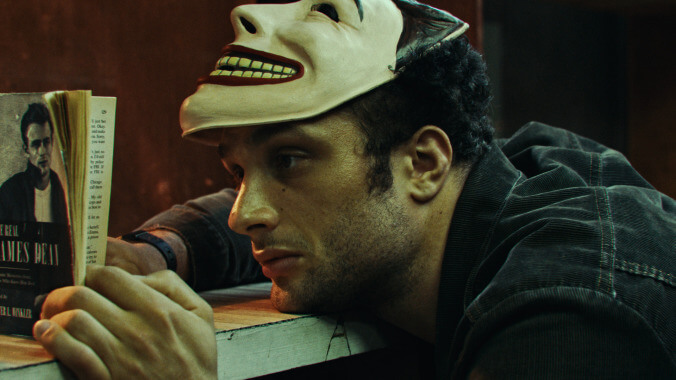
Note: The writer of this review watched Funny Face on a digital screener from home. Before making the decision to see it—or any other film—in a movie theater, please consider the health risks involved. Here’s an interview on the matter with scientific experts.
Tim Sutton’s Funny Face, in which a man in a grinning Coney Island mask and a young woman in a niqaab wander a depopulated Brooklyn, has, by an accident of timing, been turned into a baldly obvious metaphor for this past year of facial coverings and social distancing, in which we have all become the “I’m going to become the Joker” meme. In fact, the film was shot before the pandemic (it premiered at Berlin in February 2020), which raises questions about its original metaphor. Does it seem like a movie for “these times” because its take on festival-circuit fairy-tale alienation is so one-size-fits-all or because “these times” haven’t represented anything more than a mild acceleration of what was already happening in regard to corporations and the loss of public space?
At the risk of hedging an answer, it’s probably a bit of both. The world Funny Face inhabits will, for a certain audience, feel very familiar, even in its anachronisms: This is mostly a cellphone-free zone, with a slow pace, wayward souls, and a male lead who, in a more realistic setting, would seem like a real creep. To be fair to Sutton, a quiet-mode director who took a swing at genre material with his last film, Donnybrook, this is what it looks like if you remove phones and social media from a modern love story equation—which is to say, a lot of walking, eating, and awkward silence. And that in itself can be taken as pointed commentary.
The aforementioned male lead, Saul (Cosmo Jarvis), makes for a likable presence whenever he’s allowed to show some neurotic energy, chewing through a Brooklyn accent that feels as out of time as his character’s fascination with James Dean. But mostly, Jarvis’ Saul is quiet and aimless in ways that aren’t specific to any generation. He has a bedroom covered in punk posters, appears to have no friends, and works at a local bodega for cash. A mask literally falls from the sky, and of course he puts it on.
The opening sequence, which crosscuts Saul’s nocturnal wanderings with those of the recently orphaned Zama (Dela Meskienyar), seems intentionally reminiscent of early Leos Carax—specifically the lovesick stylings of Boy Meets Girl. But Sutton’s conception of a chaste romance between two characters who gradually remove their disguises (Zama trades the full veil, which she only wears sometimes, for a headscarf) is as small as Carax’s take on relationships is inflated. Saul and Zama live in a world of pizza joints, Russian delis, and buffets. Obviously, Funny Face is trying to say something about the city: Robert Moses gets a name check, and an impassioned speech, punctuated by heavy punches, is given on the subject of the Knicks.
The villain, almost predetermined, is a tacky wannabe real estate mogul known only as the Developer (Jonny Lee Miller, who spends so much of the movie sneering that he ends up looking like the Robert De Niro version of Frankenstein’s monster). The Developer—who is, get this, not as rich as he claims—is demolishing local apartment buildings to put up parking garages and condo towers with names like The Topaz and The Diamond. At one point, he angrily shouts, “Money! Money! Money!” in the backseat of a chauffeured SUV.
Saul harbors an increasingly consuming resentment of the Developer, but the potential of a violent confrontation between the masked and the phony is treated as an afterthought. Even the film’s pleasures are mostly circuitous: Welcome appearances from Victor Garber, Rhea Perlman, and Dan Hedaya combine with glimpses of odd coupling, mundane pleasures, and fading city life straight from the United States of Jim Jarmusch. Donnybrook aside, Sutton has largely devoted his career to mood pieces like Dark Night and Memphis where concept is key. In Funny Face, he puts everything in movie-movie-ish scare quotes—a self-defeating approach for a paean to urban authenticity.
2 Comments
I saw this in the theater before the pandemic, and I thought it was wonderful. Say what you will about Hollywood pairing old men with young women, but it was clear that Audrey was enthralled to be there with Astaire, who, even at nearly 60, is an unparalleled screen dancer. And Kay Thompson, the author of Eloise? What a delight. I guess a C+ is just AV Club for “really goddamn charming.”
Is this film as creepy as the original’s attempt to pair Audrey Hepburn with a man thirty years older than her?